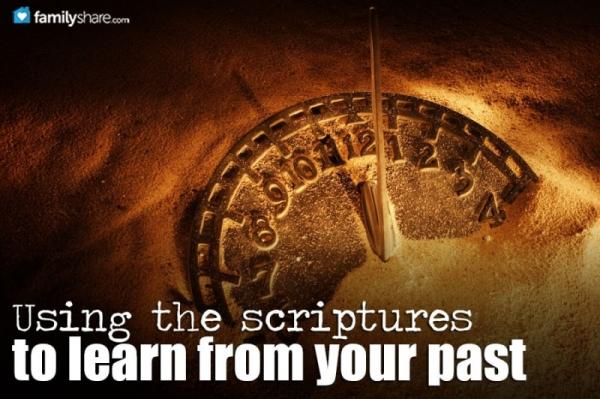
Religious scholar M. Russell Ballard said, "Those who do not remember the past are doomed to repeat it. There are great lessons to be learned from the past, and you ought to learn them so that you don't exhaust your spiritual strength repeating past mistakes and bad choices ... You don't even have to be religious to see the repeating pattern of history in the lives of God's children as recorded in the Old Testament. Time and again we see the cycle of righteousness followed by wickedness. (In) the New Testament, the historic pattern repeats itself again."
The scriptures are full of stories from the past that educate us and instruct us. God provided us with his direction in scripture form to teach us how he would like us to behave. The Savior used parables or stories to teach principles. The stories resonated with the people who heard them. The Savior's parables offer concrete examples of how to live.
In those same scriptures, we are also instructed to turn toward the future and not to wallow in past mistakes - to forgive and forget or not look back like Lot's wife did. Learn from past mistakes of others and yourself, while moving forward toward living more like God would want you to live. Forgive others for their mistakes and then try to forget them.
What can the past teach us?
Look for repeated patterns
Repeated patterns are a sign that we have something to learn. Peter, after watching his Savior taken by soldiers lied three times before the cock crowed to survive. Although we can't judge his actions, we can certainly understand them.
Many of us grew up in families that argued or were abusive. Traumatic events surrounded us. We may have chosen to move on and worked hard to live a healthier lifestyle, only to find that we are repeating patterns from our childhood. Maybe our parents fought all the time and now your spouse is becoming controlling or violently angry. Maybe you lied to your parents to cope and now you lie to your spouse.
When we find ourselves repeating patterns it is time to look clearly at what happened in our history and work with a therapist to resolve any unresolved issues. Unresolved issues are lessons that sometimes insist we learn them later. Dr. Carl Sagan said, "You have to know the past to understand the present."
Past trauma may be the originator of present addictions or habits
In the Old Testament, Moses freed the children of Israel. Because of their lack of faith, the Lord had them wander in the wilderness for 40 years, while one generation died out and the next learned to have faith.
We often develop addictions and bad behaviors to cope with trauma. Realize that binge eating or drug use made you feel better during or following a difficult event. It worked at the time. The evidence is that you, like the children of Israel, survived. We sometimes continue to use the same coping mechanisms repeatedly or become addicted. Sometimes the trauma is long gone, but the coping method, like lying, is still going strong.
Look at current addictions or behaviors you would like to change. Do you have a behavior you are ready to release and end? Think about the first time you participated in that behavior. Did it follow a traumatic event?
When we recognize and realize when and why the addiction or behavior began, then we gain a new understanding. We can be more compassionate and gentle with ourselves as we strive to end our addiction and try to heal.
Realize that every action takes you in a new direction
Ever found yourself confused and wondering how you got to where you are? Like Jonah in the whale's belly, have you ever asked yourself, "How did I get here?" These are feelings we have all felt at one point or another in our lives.
William Shakespeare said, "What is past is prologue." A prologue is defined as an event that precedes the story. Your prologue is over. When you find yourself standing on life's stage, whatever direction you go from here is your choice. Look at your past travels. Do you want to keep going in the same direction or is it time to take a new road? Pick a goal, or a point in the distance to head for to avoid traveling in circles.
Every day the future is now
Steve Jobs, founder of Apple passed away in 2011. He said, "For the past 33 years, I have looked in the mirror every morning and asked myself: If today were the last day of my life, would I want to do what I am about to do today? And whenever the answer has been, 'No,' for too many days in a row, I know I need to change something." Change one thing and change your direction.
What do we forget and when do we forgive?
Forget to be angry, forget to remind your spouse 10 times a day of his or her past mistakes. Forgive 70 times seven. Sometimes we are the victims of others. When we forgive, if you are Christian, we are giving our problems to the Savior. We are saying, "The Savior's atonement was enough for me." Conversely, when we take the problem back from the Savior and wrestle with it some more, we are saying, "I don't trust the Savior with my problem. I choose not to forgive and the atonement wasn't enough for me."
Although we need to remember the past to avoid repeating it, we can hand it to the Savior. Turn toward the future, walking with faith. Look forward, and teach your family to learn from the past.

